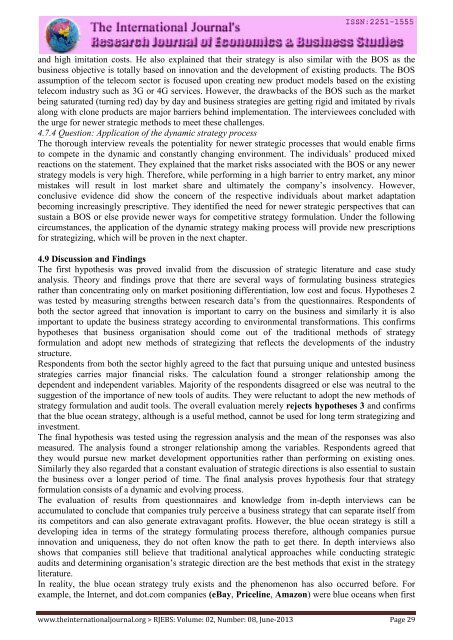Research Journal of Economics & Business Studies - RJEBS - The ...
Research Journal of Economics & Business Studies - RJEBS - The ...
Research Journal of Economics & Business Studies - RJEBS - The ...
- No tags were found...
You also want an ePaper? Increase the reach of your titles
YUMPU automatically turns print PDFs into web optimized ePapers that Google loves.
and high imitation costs. He also explained that their strategy is also similar with the BOS as the<br />
business objective is totally based on innovation and the development <strong>of</strong> existing products. <strong>The</strong> BOS<br />
assumption <strong>of</strong> the telecom sector is focused upon creating new product models based on the existing<br />
telecom industry such as 3G or 4G services. However, the drawbacks <strong>of</strong> the BOS such as the market<br />
being saturated (turning red) day by day and business strategies are getting rigid and imitated by rivals<br />
along with clone products are major barriers behind implementation. <strong>The</strong> interviewees concluded with<br />
the urge for newer strategic methods to meet these challenges.<br />
4.7.4 Question: Application <strong>of</strong> the dynamic strategy process<br />
<strong>The</strong> thorough interview reveals the potentiality for newer strategic processes that would enable firms<br />
to compete in the dynamic and constantly changing environment. <strong>The</strong> individuals’ produced mixed<br />
reactions on the statement. <strong>The</strong>y explained that the market risks associated with the BOS or any newer<br />
strategy models is very high. <strong>The</strong>refore, while performing in a high barrier to entry market, any minor<br />
mistakes will result in lost market share and ultimately the company’s insolvency. However,<br />
conclusive evidence did show the concern <strong>of</strong> the respective individuals about market adaptation<br />
becoming increasingly prescriptive. <strong>The</strong>y identified the need for newer strategic perspectives that can<br />
sustain a BOS or else provide newer ways for competitive strategy formulation. Under the following<br />
circumstances, the application <strong>of</strong> the dynamic strategy making process will provide new prescriptions<br />
for strategizing, which will be proven in the next chapter.<br />
4.9 Discussion and Findings<br />
<strong>The</strong> first hypothesis was proved invalid from the discussion <strong>of</strong> strategic literature and case study<br />
analysis. <strong>The</strong>ory and findings prove that there are several ways <strong>of</strong> formulating business strategies<br />
rather than concentrating only on market positioning differentiation, low cost and focus. Hypotheses 2<br />
was tested by measuring strengths between research data’s from the questionnaires. Respondents <strong>of</strong><br />
both the sector agreed that innovation is important to carry on the business and similarly it is also<br />
important to update the business strategy according to environmental transformations. This confirms<br />
hypotheses that business organisation should come out <strong>of</strong> the traditional methods <strong>of</strong> strategy<br />
formulation and adopt new methods <strong>of</strong> strategizing that reflects the developments <strong>of</strong> the industry<br />
structure.<br />
Respondents from both the sector highly agreed to the fact that pursuing unique and untested business<br />
strategies carries major financial risks. <strong>The</strong> calculation found a stronger relationship among the<br />
dependent and independent variables. Majority <strong>of</strong> the respondents disagreed or else was neutral to the<br />
suggestion <strong>of</strong> the importance <strong>of</strong> new tools <strong>of</strong> audits. <strong>The</strong>y were reluctant to adopt the new methods <strong>of</strong><br />
strategy formulation and audit tools. <strong>The</strong> overall evaluation merely rejects hypotheses 3 and confirms<br />
that the blue ocean strategy, although is a useful method, cannot be used for long term strategizing and<br />
investment.<br />
<strong>The</strong> final hypothesis was tested using the regression analysis and the mean <strong>of</strong> the responses was also<br />
measured. <strong>The</strong> analysis found a stronger relationship among the variables. Respondents agreed that<br />
they would pursue new market development opportunities rather than performing on existing ones.<br />
Similarly they also regarded that a constant evaluation <strong>of</strong> strategic directions is also essential to sustain<br />
the business over a longer period <strong>of</strong> time. <strong>The</strong> final analysis proves hypothesis four that strategy<br />
formulation consists <strong>of</strong> a dynamic and evolving process.<br />
<strong>The</strong> evaluation <strong>of</strong> results from questionnaires and knowledge from in-depth interviews can be<br />
accumulated to conclude that companies truly perceive a business strategy that can separate itself from<br />
its competitors and can also generate extravagant pr<strong>of</strong>its. However, the blue ocean strategy is still a<br />
developing idea in terms <strong>of</strong> the strategy formulating process therefore, although companies pursue<br />
innovation and uniqueness, they do not <strong>of</strong>ten know the path to get there. In depth interviews also<br />
shows that companies still believe that traditional analytical approaches while conducting strategic<br />
audits and determining organisation’s strategic direction are the best methods that exist in the strategy<br />
literature.<br />
In reality, the blue ocean strategy truly exists and the phenomenon has also occurred before. For<br />
example, the Internet, and dot.com companies (eBay, Priceline, Amazon) were blue oceans when first<br />
www.theinternationaljournal.org > <strong>RJEBS</strong>: Volume: 02, Number: 08, June-2013 Page 29

















